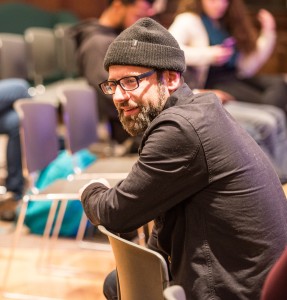Yesterday, poet and Artistic Director of Young Chicago Authors (YCA) Kevin Coval came to Grinnell to facilitate a workshop on reclaiming the ode in contemporary poetry and to present a reading about his work. Coval is the founder of Louder Than A Bomb (LTAB), an annual youth poetry festival in Chicago that is sponsored by YCA, an organization that provides free programming, workshops and residencies in schools throughout the city and surrounding suburbs of Chicago. LTAB began with four slam teams in the basement of a theatre and is now a week-long festival with more than 100 participating teams from high schools all across the Chicagoland area. The S&B’s Kelly Pyzik sat down with Coval for an interview.
When you first started LTAB, what did you hope it would become?
I wanted LTAB to be the kind of cultural space that I’d always hoped for in high school. … I thought that there were a lot of young people like me, from anywhere, who wished to commune with people who were and were not like them. … I think young people continue to come to the festival because it is unlike any other cultural space in the city. I hope it is a space that continues to value and uphold and maintain the integrity of that creative space for young people … their voices actually do matter. I think in traditional educational settings and cultural settings … we misrepresent young people. Now they have an opportunity to right that image of themselves by being the ones to articulate that story, once you invert traditional paradigms of inequity and once you intentionally counter dominant cultural space by encouraging that kind of radical diversity. We tried to cross every socioeconomic boundary we can. There’s a ton of different zip codes represented in LTAB, and that’s intentional—to do the work of community organizing, and then to do the educational work of getting young people from all over the city and Chicagoland area to come together to do this one thing of talking about what matters to them …
Do you think there’s something that changes between writing in high school and in college?
… Generally, people are not necessarily encouraged to be creative, and I think we’ve done the work in the city to try to ensure that young people in Chicago can be encouraged to be creative. College is a different space, there’s a lot of pressure in college to determine what you’re going to major in, to find out what you’re going to do after college and I think that is antithetical to the purpose of a liberal arts education. I think the initial idea of having a four-year university is to isolate people in a space where they can begin to explore ideas, not where they have to determine what kind of worker they will be. It seems like a real missed opportunity to not encourage college students to be wildly creative, to make a lot of mistakes, to explore a hundred things or more—whatever their fancy is. The idea of a major is kind of silly—I think you can focus if you feel like you can focus, but I feel like this time, even through your 20s, should just be about radical, wild exploration. You should be able to determine what your own educational, creative path should be. … The desire to routinize a labor force becomes dehumanizing, because then you’re not really encouraged to just be. I think that’s a problem.
I assume you must be a pretty busy guy by this point, how do you make time to write?
For me, the time to write is the most important. One of my mentors, Haki Madhubuti, … he taught me that you always have to put the poet first, because that’s the thing that no one really will encourage you to do, but you have to push yourself to do. It’s a discipline, it’s a craft … you have to make room for it in your life. A long time ago, I learned to try to discipline myself in writing, so I try to wake up at the same time every morning and write. … If I could keep that time, then I’m a better everything. If I’m doing my job as a poet, I’m a better educator … organizer … person … man … mentor. That time for me is sacred. When I miss it, I really miss it, I feel it, it’s important…
YCA started college slams also this year, what is the vision behind that?
This year what we did a little different, is that we wanted to meet college students who populate the downtown area in the Fall. … We know that once our students get out of high school, they still have the desire to communicate and participate in spoken word and hip hop cultural spaces. We want to maintain what they were doing in high school, give them a space to do it in college, but also get to meet people from around the country who are coming to Chicago, create that space for them to do that there, too, and meet other people who are like-minded or into the same art. Our idea is that those college students could also help to mentor or create high school spaces as well. Two years ago, YCA created a teaching artist corps, which is six young teaching artists—working poets—who have come through the festival and are now on the other side … and are going out into the high schools to meet and organize and recruit new students for the festivals. Those folks are going around the city doing that work, and we want to create more and more of that work—where anybody who comes to the festival, if they’re interested in education, teaching, creative writing workshops, organizing a team, co-teaching a team—we would love to give them that educational opportunity, as well, building an army.




















































